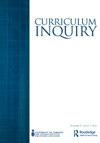乌玛的记忆和愿景:关系团结中的反思
IF 1.6
3区 教育学
Q2 EDUCATION & EDUCATIONAL RESEARCH
引用次数: 0
摘要
摘要我们是四位生活在龟岛上的种族化流散穆斯林妇女,她们的根横跨印度、巴勒斯坦、巴拿马、特立尼达、马来西亚和其他地区。50多年来,我们一直参与激进主义和组织活动,包括与穆斯林社区合作和为穆斯林社区服务。我们关于穆斯林团结教育的对话和通信引发了个人和集体对创建和维持社区意味着什么的反思。我们是在社区中产生的,并有意与其他人建立社区,无论是穆斯林还是其他人,他们让我们成为更完整的人。我们遵循伊斯兰教义,以及植根于不同知识传统的正义和解放教义。我们也受到激进的黑人、土著人和有色人种提供的知识和认识方式的影响,他们在海龟岛和更广阔的世界上为自由进行集体斗争。作为穆斯林,我们被称为“相互了解”(《古兰经》,49:13,Nasr等人,2015年引用)。我们认为,要做到这一点,就需要我们面对内在支配和内在从属的模式,这些模式阻止我们彼此相处。这种对抗使我们能够共同努力,拆除阻碍我们更充分地成为人类的相互关联的压迫制度。在这篇多声部的反思性文章中,我们通过深入研究我们对乌玛的记忆、穆斯林社区、我们对乌玛赫不断发展的理解,以及建立乌玛赫所必需的关系团结,来探索社区和团结之间的关系。将我们对乌玛的记忆和愿景编织在一起的是古老而未来主义的育儿实践。本文章由计算机程序翻译,如有差异,请以英文原文为准。
Memories and visions of ummah: Reflections in relational solidarity
Abstract We are four racialized diasporic Muslim women living on Turtle Island, with roots spanning India, Palestine, Panama, Trinidad, Malaysia, and beyond. We have been involved in activism and organizing, including with and for Muslim communities, for more than five decades combined. Our conversations and correspondence about Muslim pedagogies of solidarity provoked individual and collective reflection about what it means to create and sustain community. We were made in community and have made communities intentionally with others, Muslim or otherwise, who allow us to be more fully human. We are guided by Islamic teachings, as well teachings of justice and liberation rooted in different knowledge traditions. We are shaped too by the knowledge and ways of knowing offered by radical Black, Indigenous, and People of Colour engaged in the collective struggle for freedom on Turtle Island and in the wider world. As Muslims, we are called “to come to know one another” (Qur’an, 49:13, as cited in Nasr et al., 2015). We suggest that to do so requires us to confront patterns of internalized domination and internalized subordination that prevent us from being with and for one another. Such confrontation enables us to work collectively to dismantle interlocking systems of oppression that prevent us from being more fully human. In this multivocal reflective essay, we explore the relationship between community and solidarity by delving into our memories of ummah, Muslim community, our evolving understandings of ummah, and the relational solidarity that is necessary to establish ummah. A thread that weaves together our memories and visions of ummah is the ancient and futuristic practice of mothering.
求助全文
通过发布文献求助,成功后即可免费获取论文全文。
去求助
来源期刊

Curriculum Inquiry
EDUCATION & EDUCATIONAL RESEARCH-
CiteScore
3.10
自引率
17.60%
发文量
37
期刊介绍:
Curriculum Inquiry is dedicated to the study of educational research, development, evaluation, and theory. This leading international journal brings together influential academics and researchers from a variety of disciplines around the world to provide expert commentary and lively debate. Articles explore important ideas, issues, trends, and problems in education, and each issue also includes provocative and critically analytical editorials covering topics such as curriculum development, educational policy, and teacher education.
 求助内容:
求助内容: 应助结果提醒方式:
应助结果提醒方式:


